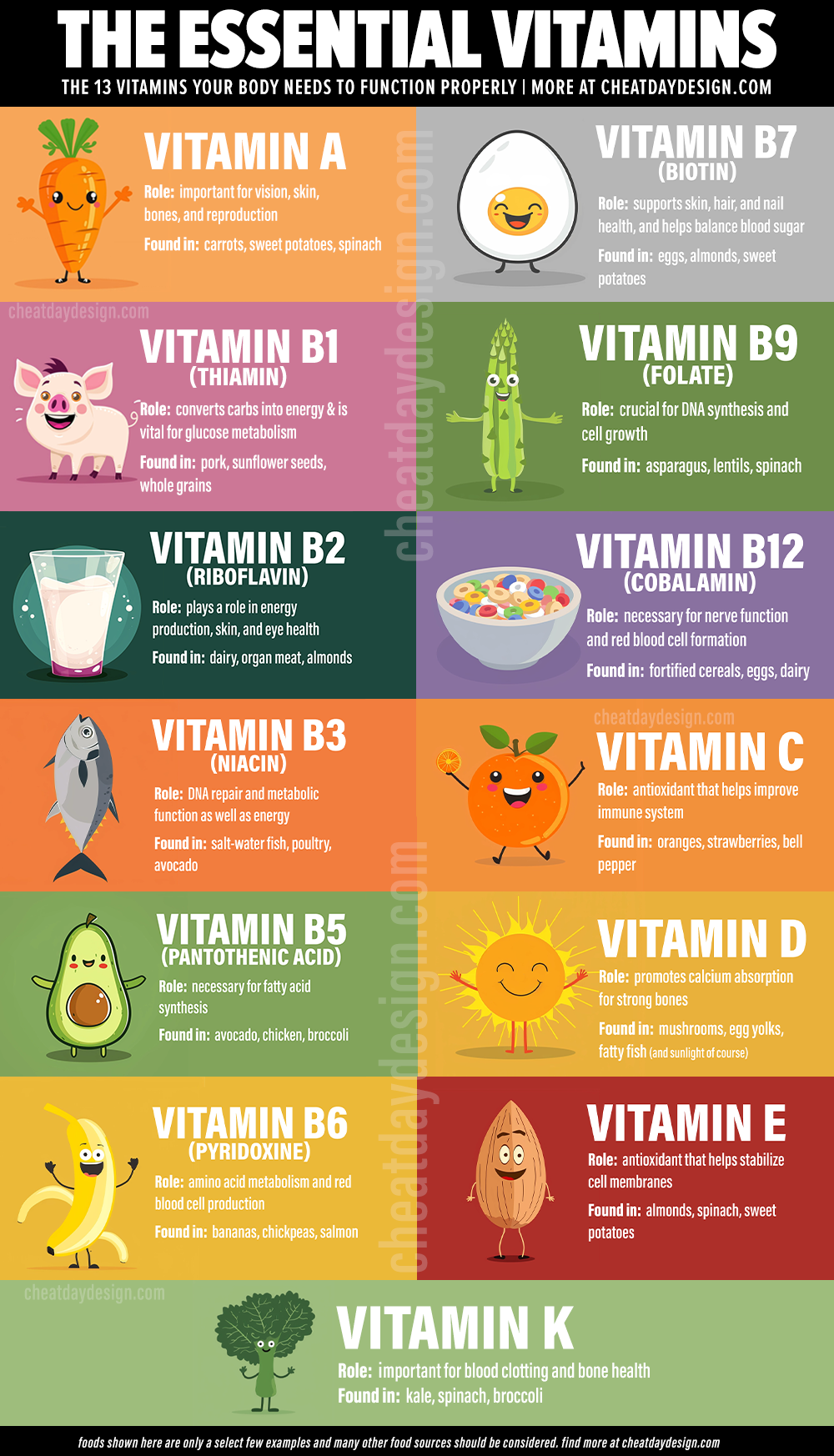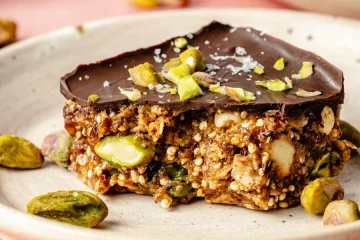We’ve all grown up being told to take our vitamins, and many of us currently take multivitamins as well. We know that vitamins are healthy… but do we actually know why we need each vitamin?
Let’s break down all 13 vitamins your body needs, what they do, and where we can find them.


Highlights
- Fat-soluble vitamins include A, D, E, and K, which are stored in the body’s fatty tissues and liver.
- Water-soluble vitamins, such as C and all B vitamins, are not stored in the body and need to be replenished regularly through diet.
- Minerals, distinct from vitamins, play vital roles in the body, including bone health, fluid balance, and muscle contraction.
I’ve been taking my vitamins since back in the Flinstone Vitamins days (side note, I choked on one once… yes, a chewable vitamin. But that’s a story for another day). I never really knew why I was consuming any of them, but I was told that I needed vitamins.
I knew Vitamin C helped if you had a cold, but that was as far as my knowledge went.
I’m willing to bet I’m not alone there. I talk a lot about macronutrients on my blog, so let’s dive into micronutrients a bit.
Micronutrients are everything in food that doesn’t contain a caloric value.
Whereas macronutrients are what you look at to help control your body composition (like prioritizing protein to build muscle), micronutrients are what you want to look at for your overall health. All of your bodily functions require vitamins to perform optimally, so they are very important!
Before we dive into each vitamin, let’s address the elephant in the room: do you need to take a vitamin supplement?
In a lot of cases, no. However, I don’t discourage taking a multivitamin if you can afford it.
As you can see from the chart above, there are A LOT of sources of each vitamin. If you eat a well-rounded diet, there’s an excellent chance you are consuming enough of the vitamins you need.
Vitamins can help fill in the gaps if your diet isn’t balanced, but food should always be the main source of your vitamins.
Two Types of Vitamins: Fat Soluble & Water Soluble
There are 13 recognized vitamins that the human body requires for proper functioning, and we’re going to touch on all of them here.
Vitamins fall into one of two categories: fat soluble and water soluble.


The Fat-Soluble Vitamins
The fat-soluble vitamins are A, D, E, & K, and they are found in mostly fatty foods (with exceptions of course).
Fat-soluble vitamins are stored in fat in the body (not bodyfat, but in the fat tissue surrounding your organs that we ALL have, regardless of how lean you are). The body can then access these vitamins as needed.
If you consume more fat-soluble vitamins than you need, the body can store the excess vitamins for later use.
And as you can see, fat soluble vitamins are the vitamins that help with a lot of important bodily functions:
- Vitamin A: Healthy vision, bones, teeth, amongst other things
- Vitamin D: Bone & teeth health
- Vitamin E: Acts an an antioxidant protecting cells from being damaged
- Vitamin K: For healthy blood, specifically assisting with blood clotting
As you can see, these vitamins help majorly with your overall body health, so it’s important to prioritize them in your diet!
Water-Soluble Vitamins
The water-soluble vitamins are vitamin C and all of the B vitamins, which are the vitamins you are likely most familiar with.
What makes water-soluble vitamins different than fat-soluble vitamins? Water soluble vitamins aren’t stored the same way, so if they aren’t needed, they’ll pass right through the body, getting exctreted through urine. You can think your kidneys from preventing too much of these vitamins from staying in your body!
Water soluble vitamins are much more easily absorbed than fat soluble vitamins however, so they get to work much more quickly.
As you likely know from the many over-the-counter cold remedies, vitamin C helps your immune system. While it has never been proven to actually cure a common cold (the reason a lot of people take it) it can certainly help to lower the chances of getting sick overall by strengthening your immune system.
There’s a limit to this of course, and more vitamin C doesn’t actually mean it’s helping you more.
For example, if you come down with a cold, and you start plowing through Emergen-C in an attempt to get better, all you’re doing is paying more for some bright yellow urine. Since your body only absorbs what it needs and pees out the rest, there is really no benefit to consuming more Vitamin C than the daily recommended amount.
At the end of the day, it’s all just going right through you!
One common misconception about B vitamins is that since they help convert food into energy, they burn calories.
While B vitamins do provide energy (they’re staples in lots of energy drinks) they do not provide CALORIC energy.
I want to help make that point clear: B vitamins do not burn calories.
When I say that they help convert food into energy, essentially what they are doing is taking the food that has already been digested (AKA the calories burned through digestion have already occured) and helping to turn that food into ATP for energy.
All 13 Vitamins Your Body Needs
Let’s break down the 13 vitamins our bodies need, where to find them, and what they do for us.
Vitamin A



What does vitamin A do and why is it important?
Vitamin A is a water-soluble vitamin that is important for vision and the immune system. It helps form the retina in the eye, helps with cell division, and supports growth and development.
Vitamin A can also help fight against respiratory infections, including pneumonia.
What foods is vitamin A found in?
Vitamin A is found in carrots, green leafy vegetables, liver, cod liver oil, and fortified cereals.
Vitamin B1 (Thiamin)



What does thiamin do and why is it important?
Thiamin (vitamin B1) is important for the body’s energy production. It is involved in the conversion of food into energy and helps to maintain nerve function.
Some health problems that can be prevented by getting enough thiamin include beriberi, anemia, and heart disease. Beriberi is a form of vitamin B deficiency that can cause problems with the heart and brain. Anemia is a lack of red blood cells that can lead to fatigue, headaches, and shortness of breath.
Which foods are good sources of thiamin?
Thiamin is found in many foods, but some good sources include: pork, whole grains, legumes, nuts and seeds, watermelon, and spinach.
Vitamin B2 (Riboflavin)



What does riboflavin do and why is it important?
Riboflavin is a water-soluble vitamin that helps to create energy within the body. Riboflavin is important for the nervous system, red blood cell production, and collagen formation. It also helps to regulate blood sugar levels.
What food sources are rich in vitamin B2?
Vitamin B2 is most commonly found in plant-based foods. Some good sources of vitamin B2 include dairy, organ meat, legumes, whole grains, nuts, and seeds.
Vitamin B3 (Niacin)



What does niacin do and why is it important?
Vitamin b3, also referred to as niacin, is a water-soluble vitamin that is important for energy production in the body. Niacin also helps to reduce the risk of heart disease, stroke, and some forms of cancer. It also helps to improve blood flow and circulation.
What food sources are rich in vitamin B3?
Vitamin B3 is found in a variety of food sources, including salt-water fish, liver, poultry, and eggs. Some plant-based sources of vitamin B3 include avocado, peanuts, and tomato, spinach. It is also made by the body from other vitamins.
Vitamin B5 (Pantothethenic Acid)



What does Vitamin B5 do and why is it important?
Vitamin B5, also known as pantothenic acid, is essential for converting food into energy and synthesizing coenzyme-A, which is vital for fatty acid metabolism. This nutrient plays a pivotal role in the creation of red blood cells and stress-related hormones in the adrenal glands.
It’s also important for maintaining a healthy digestive tract and enables other vitamins to perform their functions effectively.
What food sources are rich in Vitamin B5?
Vitamin B5 is abundant in a variety of foods, ensuring it’s accessible through a balanced diet. Notable sources include avocado, which is particularly rich in this vitamin, as well as chicken and broccoli.
Vitamin B6 (Pyridoxine)



What does Vitamin B6 do and why is it important?
Vitamin B6 is important for several reasons. Firstly, it helps to form the neurotransmitter serotonin. Serotonin is important for regulating mood and cognitive function.
Secondly, vitamin B6 is essential for the production of red blood cells and DNA.
Thirdly, it helps to regulate blood sugar levels and plays a role in energy production.
A vitamin B6 deficiency can lead to problems with nerve function and blood sugar regulation.
What food sources are rich in Vitamin B6?
Foods high in vitamin B6 include bananas, meat, poultry, fish, legumes, nuts, eggs and fortified cereals.
Vitamin B7 (Biotin)



What does vitamin b7 do and why is it important?
Vitamin B7 is important for the body because it helps to break down food and balance blood sugar. It also helps to produce energy in the body and protect the liver.
What food sources are rich in biotin?
Foods that are high in biotin include eggs, liver, sweet potato, almonds, and legumes.
Vitamin B9 (Folate)



What does vitamin B9 do and why is it important?
Vitamin B9, also known as Folate, is crucial for DNA synthesis and repair, red blood cell formation, and cell division and growth, making it vital during pregnancy for fetal development.
What foods is vitamin B9 found in?
Rich sources of Folate include leafy green vegetables, asparagus, fruits, nuts, beans, peas, and some fortified foods.
Vitamin B12



What does vitamin B12 do and why is it important?
Vitamin B12 is important for overall health because it helps to keep the brain and nerves healthy. It also helps to make DNA and cells. It is especially important for red blood cell production and energy production.
Deficiencies in this vitamin can lead to problems with the nervous system, including dementia, and problems with the brain, including memory loss and confusion.
What food sources are rich in vitamin B12?
Vitamin B12 can be found in animal products like meat (poultry, pork, beef, and fish) and dairy, or plant-based foods like fortified cereals. B12 is also a very popular vitamin to be found in energy drinks & supplements.
Vitamin C



What does vitamin C do and why is it important?
Vitamin C is important for several reasons. It helps the body to create new cell tissue, which is important for maintaining overall health. It also helps the body to absorb other nutrients and defend against infections.
Additionally, vitamin C helps to produce serotonin, which is a neurotransmitter that can promote feelings of well-being.
What food sources are rich in vitamin c?
Vitamin C is abundant in fresh fruits and vegetables, but also can be found in fortified foods like juices and cereal.
Vitamin D



What does vitamin D do and why is it important?
Vitamin D is a vitamin that is essential for human health. It helps the body absorb calcium, phosphorus, and magnesium. It also helps to regulate the immune system and maintain healthy bones. Vitamin D deficiency can lead to rickets in children and osteomalacia in adults.
What food sources are rich in vitamin D?
The main source of vitamin D is the sun. When the skin is exposed to sunlight, vitamin D is produced in response to ultraviolet radiation, but that doesn’t mean you can’t get Vitamin D from your diet, too. Foods that are high in vitamin D include mushrooms, egg yolk, fortified milk, salmon, tuna, and liver.
Vitamin E



What does vitamin E do and why is it important?
Vitamin E is an important nutrient for the body because it helps to protect cells from damage caused by free radicals. Free radicals are chemicals that can cause cell damage and may play a role in the development of cancer.
What food sources are rich in vitamin E?
Vitamin E is a fat-soluble vitamin and is found in a variety of plant-based foods. Some of the richest sources of vitamin E include nuts, seeds, avocados, and olive oil.
Vitamin K



What does vitamin K do and why is it important?
Vitamin K is a water-soluble vitamin and is important for blood clotting. It helps to form clots in the veins which can prevent blood from flowing away from the heart, and it also helps to form bone.
Vitamin K is important for pregnant women as it helps to form the placenta.
What food sources are rich in vitamin k?
Vitamin K is found in many different types of food, including kale, collard greens, spinach, Swiss chard, broccoli, Brussel sprouts and cabbage.
Are Multivitamin Supplements Necessary?



There is debate about the necessity of multivitamin supplements, as all vitamins and minerals can be found in foods (as seen in the list above).
While vitamin supplements may not be necessary, I do not view them as harmful.
If you’re eating a well-balanced diet, a multivitamin supplement is likely not necessary. But, the truth is that many of us don’t eat very well-balanced diets, so supplements can help us fill in the gaps.
If your diet is lacking any single component (a vegan diet, a grain-free diet, or a carnivore diet all mean your diet is missing certain foods) then a multivitamin will certainly help.
A multivitamin is not a substitute for a balanced diet, but it can help bridge the gaps for an overall healthy lifestyle. The focus should always be on obtaining your vitamins from whole food, but a multivitamin can prove useful.
What About Minerals?
We’ve touched upon all of the vitamins, but what about minerals?
These building blocks of health might not grab headlines like vitamins often do, but they are just as essential for maintaining our body’s balance and function.
From the strength of our bones to the power of our muscles, minerals are just as important as vitamins. Let’s dive into the world of minerals and discover the key roles they play in our daily nutrition.



Calcium
Function: Key for bone strength and blood clotting.
Sources: Dairy, leafy greens, seeds, nuts, dates, tofu.
Magnesium
Function: Supports nerve/muscle function and immunity.
Sources: Nuts, spinach, fish, avocado, whole grains.
Phosphorus
Function: Vital for cellular functions, more than any other mineral.
Sources: Fish, poultry, eggs, leafy greens, oats, legumes.
Potassium
Function: Crucial for biological processes and heart rhythm.
Sources: Fruits, vegetables, nuts, seeds, fish.
Sodium
Function: Maintains fluid balance, helps in digestion.
Sources: Salt, fish, nuts, and in many foods.
Chloride
Function: Helps digestion and maintains pH balance.
Sources: Salt, olives, tomatoes, rye, seaweed.
Sulfur
Function: Assists digestion and waste elimination.
Sources: Eggs, avocado, garlic, fish, soy.
Iron
Function: Essential for red blood cell (hemoglobin) production.
Sources: Legumes, dried fruits, grains, spinach, liver.
Copper
Function: Aids iron absorption and metabolism.
Sources: Nuts, seeds, shellfish, potatoes.
Zinc
Function: Supports the immune system and wound healing.
Sources: Shellfish, nuts, seeds, dairy, meat.





